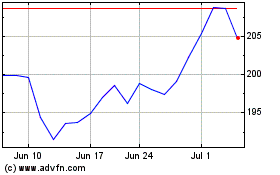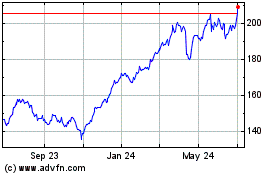Trump's Trade Policy Turns J.P. Morgan Bearish on Small, Midcap Stocks
February 02 2017 - 8:15AM
Dow Jones News
By Georgi Kantchev and Riva Gold
J.P. Morgan is turning more cautious on small and midsize
companies on a belief that President Donald Trump's stance on trade
will add to heightened political risks around the world.
The bank advised its clients Thursday to buy put options, or
derivatives that protect against declines, on indexes that track
shares of small and midsize companies. Shares in these companies
have been popular so far this year.
J.P. Morgan saw more upside potential for such stocks at the
beginning of the year, assuming that Mr. Trump would focus on his
campaign promises of a fiscal boost through tax cuts and
infrastructure spending.
"Instead, it seems like global trade is his number one focus
from the start, something which in our opinion adds downside risk
to our 2017 outlook," Eduardo Lecubarri, J.P. Morgan's global head
of small and midcap strategy, wrote in a note to clients Thursday.
"We worry about big short-term shocks to the global economy at this
stage of the game."
J.P. Morgan believes that shares of small and mid-capped
companies, those with a market capitalization between $100 million
and $5 billion, could still hold at around current levels for some
time. But the bank warns that investors are too complacent against
risks from Mr. Trump's trade policies and others, ranging from
Brexit negotiations to upcoming elections in Europe.
Small and midcap U.S. stocks have been a popular bet since the
election, on expectations that Mr. Trump's policies would lower
taxes and boost the U.S. economy. The S&P Small Cap 600 index
is up 18% in the last three months, while the S&P Mid Cap 400
is up nearly 14%, compared with a less than 9% climb for the
S&P 500 over the same period.
Many investors have bet small and midsize companies are better
positioned to weather harsher trade rhetoric and a stronger dollar,
given their greater exposure to the domestic economy.
Such companies still have significant international exposure,
the bank said.
In his first days in office, Mr. Trump's administration has
formally withdrawn from the 12-nation Pacific trade agreement,
known as the Trans-Pacific Partnership, restated his intention to
renegotiate the North American Free Trade Agreement, or Nafta, and
endorsed a new "border adjustment," which would tax businesses for
their imports, though not their exports.
Mr. Trump's policy proposals come at a time when the World Trade
Organization expects that global trade growth was at its weakest
last year since the financial crisis. That came amid rising
protectionist policies around the world and as efforts to
liberalize trade stall, economists say.
There are risks to global trade on the other side of the
Atlantic, too.
Legislation to allow Britain to begin its withdrawal from the
European Union passed its first parliamentary hurdle on Wednesday.
Economists say Brexit could raise tariffs around trade into and out
of Britain, one of the world's biggest economies.
A spate of elections in the EU's biggest member states,
including France and Germany, are also adding to political risks,
with some opposition parties demanding withdrawal from the European
Union or the eurozone.
"President Trump and U.K. Prime Minister May seem determined to
rip up what the world considered established rules of engagement in
global trade at a time when the world's economy is deeply invested
in globalization," Mr. Lecubarri said. "But the market is turning a
blind eye to risk...we find this concerning [as] 2017 is arguably
the year with the biggest political risk of the last 20."
Write to Georgi Kantchev at georgi.kantchev@wsj.com and Riva
Gold at riva.gold@wsj.com
(END) Dow Jones Newswires
February 02, 2017 08:00 ET (13:00 GMT)
Copyright (c) 2017 Dow Jones & Company, Inc.
JP Morgan Chase (NYSE:JPM)
Historical Stock Chart
From Aug 2024 to Sep 2024

JP Morgan Chase (NYSE:JPM)
Historical Stock Chart
From Sep 2023 to Sep 2024
